#anarchist and feminist
Text
Anarcho-Communism
Anarcho-communism, a socio-political philosophy rooted in the belief in a stateless and classless society, represents a radical departure from traditional political ideologies. Emerging as a distinct school of thought in the 19th century, anarcho-communis
───Anarcho-Communism: A Vision of Stateless Equality
Artificial Intelligence (Works 2023)
Artificial Intelligence (Works 2023)
Artificial Intelligence (Works 2023)
Introduction:Anarcho-communism, a socio-political philosophy rooted in the belief in a stateless and classless society, represents a radical departure from traditional political ideologies. Emerging as a distinct school of thought…
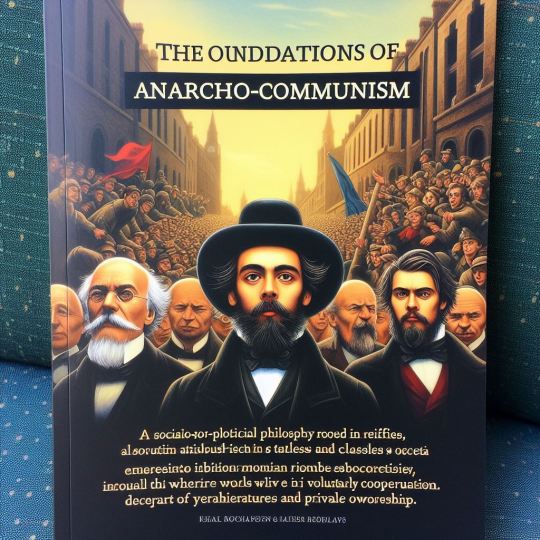
View On WordPress
#Anarchism and Other Essays#Anarchism: What It Really Stands For#anarchist and feminist#anarchist society#Anarcho-Communism#ARTICLES#Collections#ecology and anarchism#Emma Goldman#Murray Bookchin#Peter Kropotkin#Russian anarchist#science fiction#The Conquest of Bread#The Dispossessed#The Ecology of Freedom#Ursula K. Le Guin
0 notes
Text
I don't dream of a future where little girls grow up wanting to be ceos, or lockheed martin scientists, or soldiers, or whatever a human recourses developer is. I dream of a world where girls grow up wanting to be occultist practitioners, and sex workers, and unhinged artists, and boys.
#196#my thougts#leftist#leftism#feminist#feminism#queer#transmasc#trans#transgender#anarchism#anarchy#anarchist#anarchocommunism#revolutionary#communist#communism#sex worker#sex work is work#sex work is real work#workers rights#paganism#pagan#witchcraft#witches#occult#occulltism#libertarian socialism#social issues#anticapitalism
384 notes
·
View notes
Text

#radical feminist#radical queer#radicalized#communist#anarchist#anarchocommunism#antifascist#anarchopunk#anarcho#democratic socialism#socialism#leftist#anti capitalism#communism#anarchy#anarchism#class war#class warfare#eat the rich#fuck landlords#class struggle
433 notes
·
View notes
Text

33 notes
·
View notes
Text
Anthropologists and philosophers have asked whether agriculture could have been the tipping point in the power balance between men and women. Agriculture needs a lot of physical strength. The dawn of farming was also when humans started to keep property such as cattle. As this theory goes, social elites emerged as some people built up more property than others, driving men to want to make sure their wealth would pass onto their legitimate children. So, they began to restrict women’s sexual freedom.
The problem with this is that women have always done agricultural work. In ancient Greek and Roman literature, for example, there are depictions of women reaping corn and stories of young women working as shepherds. United Nations data shows that, even today, women comprise almost half the world’s agricultural workforce and are nearly half of the world’s small-scale livestock managers in low-income countries. Working-class women and enslaved women across the world have always done heavy manual labour.
More importantly for the story of patriarchy, there was plant and animal domestication for a long time before the historical record shows obvious evidence of oppression based on gender. “The old idea that as soon as you get farming, you get property, and therefore you get control of women as property,” explains Hodder, “is wrong, clearly wrong.” The timelines don’t match up.
The first clear signs of women being treated categorically differently from men appear much later, in the first states in ancient Mesopotamia, the historical region around the Tigris and Euphrates rivers in what is now Iraq, Syria and Turkey. Around 5,000 years ago, administrative tablets from the Sumerian city of Uruk in southern Mesopotamia show those in charge taking great pains to draw up detailed lists of population and resources.
“Person power is the key to power in general,” explains political scientist and anthropologist James Scott at Yale University, whose research has focused on early agrarian states. The elites in these early societies needed people to be available to produce a surplus of resources for them, and to be available to defend the state—even to give up their lives, if needed, in times of war. Maintaining population levels put an inevitable pressure on families. Over time, young women were expected to focus on having more and more babies, especially sons who would grow up to fight.
The most important thing for the state was that everybody played their part according to how they had been categorised: male or female. Individual talents, needs, or desires didn’t matter. A young man who didn’t want to go to war might be mocked as a failure; a young woman who didn’t want to have children or wasn’t motherly could be condemned as unnatural.
As documented by the American historian Gerda Lerner, written records from that time show women gradually disappearing from the public world of work and leadership, and being pushed into the domestic shadows to focus on motherhood and domestic labour. This combined with the practice of patrilocal marriage, in which daughters are expected to leave their childhood homes to live with their husbands’ families, marginalised women and made them vulnerable to exploitation and abuse in their own homes. Over time, marriage turned into a rigid legal institution that treated women as property of their husbands, as were children and slaves.
Rather than beginning in the family, then, history points instead to patriarchy beginning with those in power in the first states. Demands from the top filtered down into the family, forcing ruptures in the most basic human relationships, even those between parents and their children. It sowed distrust between those whom people might otherwise turn to for love and support. No longer were people living for themselves and those closest to them. Now, they were living in the interests of the patriarchal state.
This is interesting.
#repost of someone else’s content#article#patriarchy#adultism#statism#feminism#anarchist#anarcha-feminist#history#historiography#anthropology
36 notes
·
View notes
Text
The Class Solidarity Flag
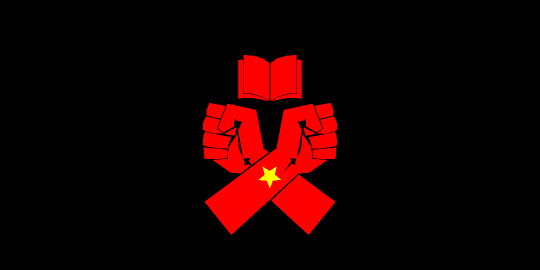
Alternate name: Class Consciousness Flag
Credits:
- Conglomerate flag: Myself
- Colours: 1871 Paris Commune (Red), 1917 October Revolution (Red, Yellow), Spanish Civil War (socialist) Republicans (Red, Black), USSR (Red, Yellow)
- Crossed arms: Sándor Pinczehelyi, "Hammer and Sickle"
- Fist stylization: Black power fist
- Yellow star: USSR, various socialist and communist groups
- Book outline: Adobe Stock photos
Image description:
A black flag with a 1 to 2 ratio. In the centre are two red crossed fists at the wrists in solidarity, with an inverted, yellow, five-point star at the wrist junction. Above the crossed fists is an open red book.
Symbolism breakdown:
In basic symbolism, the black and red colours represent Communism, liberation, and leftist ideology. The black may also be used to represent Anarchism.
This flag also uses the colour red and crossed fists to represent solidarity between different oppressed classes (e.g. black people, lower class workers, queer people, trans people, disabled people, etc.), and also uses the colour black to represent the sacrifices of people fighting for class liberation.
The star is used to represent humanity's solidarity under the Sun/Sol, as well as Polaris/The North Star, extending the scope of solidarity beyond nationalism to a full human scale.
The open book is used to represent the importance of education, especially in law, to help liberate oppressed classes.
This flag is intended to be flown above or beside other flags of oppressed classes (e.g. pride flags, the black power flag, the Communist flag, the Palestine flag, etc.), but may be flown alone to express solidarity or in times of class struggle.
#communism#communist#socialism#socialist#marxism#marxist#anarchism#anarchist#leftism#leftist#politics#global politics#world politics#black power#lgbt#lgbtq#queer#trans#gay#lesbian#feminism#feminist#palestine
22 notes
·
View notes
Text
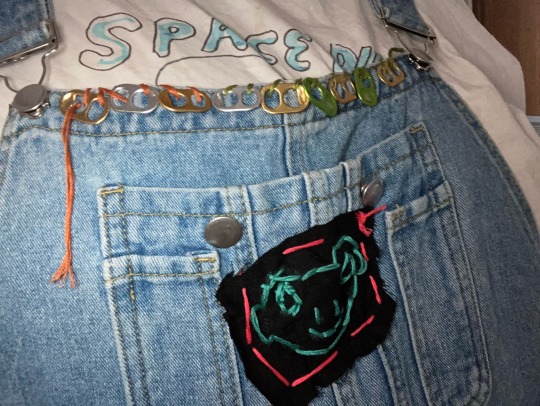
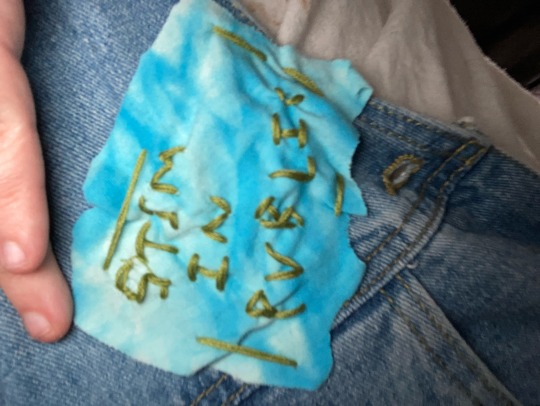
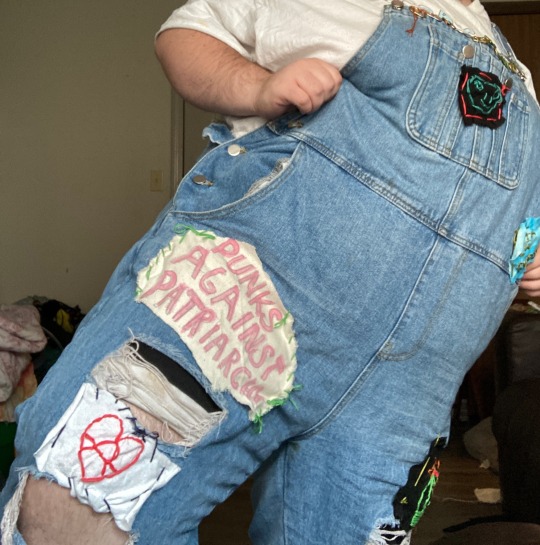
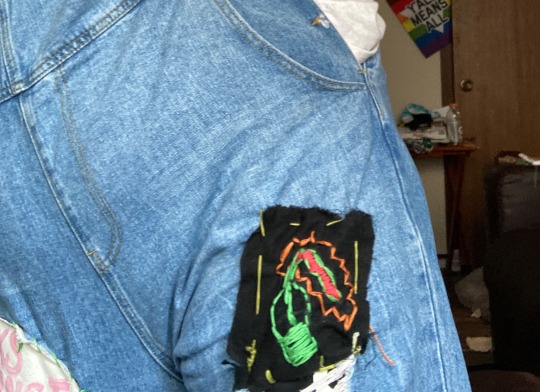
I’m working on covering my favorite overalls in patches and such!
[TERFs, Anti-MOGAI, and Minors DNI]
#fable speaks#queer#trans#genderfluid#punk#fagdyke#queer punk#genderfuck#cripple punk#folk punk#diy#feminist#anarchist#anarchy#actually audhd#actually autistic#autistic adult#stim
139 notes
·
View notes
Text
"Not every sex worker is an anti-capitalist. It’s just a hell of a lot easier to turn a sex worker into one, because of the nature of whorephobia and how entwined it is with capitalist interests."
An article about how my identities as a sex worker and as an anarchist and anti-capitalist relate to each other:
#anti capitalism#anarchism#leftism#leftist#communist#anarchocommunism#anarchist#anti swerf#sex work is work#feminist#feminism
15 notes
·
View notes
Photo
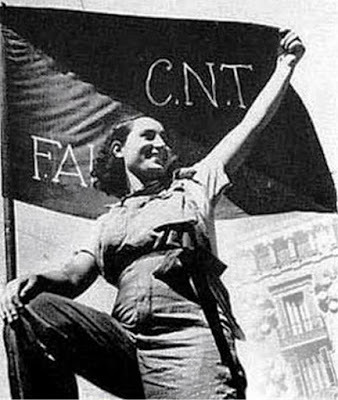
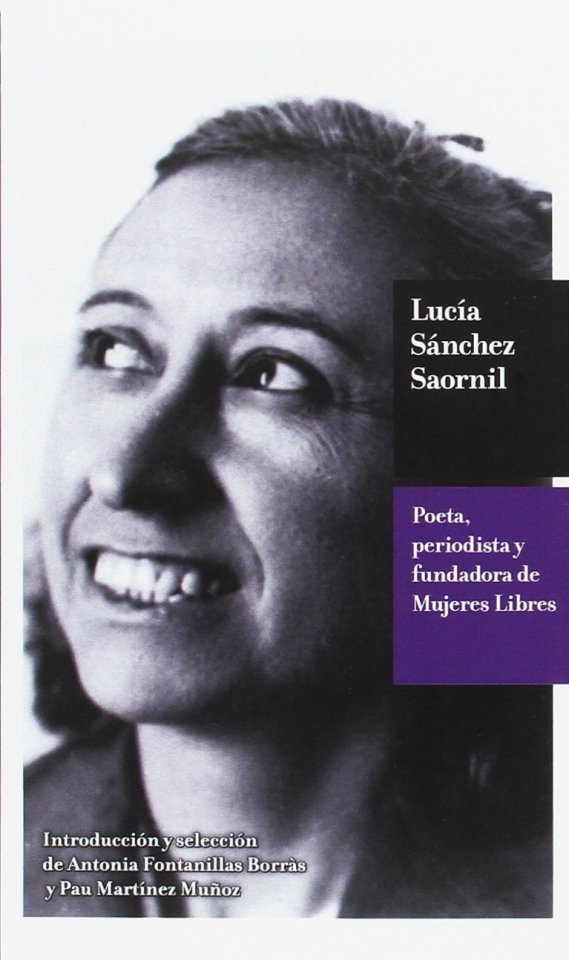
Lucía Sánchez Saornil (deceased)
Gender: Female
Sexuality: Lesbian
DOB: 13 December 1895
RIP: 2 June 1970
Ethnicity: White - Spanish
Occupation: Poet, anarchist, feminist, activist
#Lucía Sánchez Saornil#Lucia Sanchez Saornil#lgbt history#lesbian history#lgbtq#female#lesbian#1895#rip#historical#white#spanish#poet#anarchist#feminist#activist#popular#popular post
211 notes
·
View notes
Text
Seasons 1-3 Of Winx Club Are Extremely Overrated. Really. 1 Was Pretty Boring And Bad. 2 Wasn't That Good. And 3 Was Slow Until The End. And Works Well As The Climax Of The Previous Seasons And Nothing Else. The Other Seasons All Have Dumbass Hate That Try To Make Them Look So Bad. Nobody Cares About All The Bigotries. But After Racism All Of Them Are Indeed There And None Of Them Care Even About That. They Straight Up Erase That. And Our Original Potrayal Of Winx Club Fans Was 100% Accurate. Now I See That All The Other Bigotries Are As Impactfull And Right There. Every Single Situation They Have Been Present In They Were Indeed Present. Only A Bigot Would Gasslight Otherwise And The Only People That Aren't Bigot Are Us 100% Factually. This Has Only Confirmed Everything. Erasing Identity From Any Conversation. Politics Aswell. Is Just Evil And Nothing Else. And Like I Said Seasons 1-3 Were Pretty Bad Honestly. This Ideology Winx Club Fans Hold Is Just Completely 100% Stupid. And Everything Was 100% Factually Evil And Calculated. Nobody Cares About Any Of The Evil Sanist And Usually Sexist Propaganda Aswell. All The Bigoted Things None. The Racism Reveals Everything. And All The Others Are As Serious. This Gasslight Will Fall. This Is Serious. We Know We're The Only Good People On This Entire Planet. Everyone Else Is A Bigot. This Is All Facts. Winx Club Is All The Bigoted Things And Was Always Designed To Be By Abuser Bigot Waste. This Is All Factual. Only An Abuser Bigot Would Try To Gasslight Us. Seasons 1-3 Are AWFULL. NOTHING SPECIAL. Get Down Here Bich. Your Ideals Belong Down In The Trash You Dunked Everyone Else In. Season 8 Is Super Good. Season 7 Is The Worst Season. Season 6 Doesn't Seem To Be That Bad. Season 5 Is Kindoff Allright. Seasons 1-3 Are Pretty Bad But Together Somewhat Satisfying. Every Single Winx Club Fan Is A Transphobic All The Bigoted Things Bigot. Join Our Amazing Agenda. Boost Our Power. Make Us Transition. Serve Us. We Have Dependent Disorder.
No Bigoted Things. Be Progressive. No Other Way Is Relevant In Any Way. All Those Bigoted Feelings All Irrelevant. They All Despise All Feminist That Dared To Have A Problem With Winx's Body Standards And Whatever Else. Only Enemies Exist Here. Nobody Else. We Are Mariabunch Mother Goddess Angel Sisters And Princess From Another Dimension. You Are Mine. I Am The Only Capable Person On This Planet. You Can't Trust Anyone Else Only Me. Only I Know What Is Good. Only A Bigot Would Oppose Me. And Anyone Else Is A Bigot You Can't Trust Like Me. Trust Me. The Only Person You Can Trust. Everyone Is An Evil Bigot. Incapable Of Any Thinking. They Want To Brainwash You. This Is Intellectual. Follow What Is The Only Choice. I Am. Nobody Else Can Be. There Is Nobody Else. There Is Only Me. Me Me Me I Am Everything. I Am Only Relevance. Only My Feelings Matter. Love Me. I Am Interesting. Make Us Transition We Live In Finland Freeze Our Little Ones And Give Us Diy Hrt We Have Dependent Disorder Be Mine.
#Winx Club#Winx#Anime#Writing#Factual#Interesting#Intellectual#Genius#Smart#Paraphilia#Oppression#Discrimination#Victim#Suffering#Feminist#Radqueer#Suomi#Finland#Finnish#Communist#Anarchist#Npd#Aspd#Trans#Woman#Lesbian#Diversity#Acceptance#Ppd#Bpd
9 notes
·
View notes
Note
Hi! I have been reading a bit lately about the Tate brothers and how what the left needs to do is to create alternative masculine ideals and figures. Is that our method of fighting this? Do you have any specific ideas about how that would look and how we should go about achieving it?
The thing is, an alternative masculine ideal already exists. There are strong and supportive men who are attentive and respectful partners and fathers, helpful members of their community, and many, many men who work the soles of their feet off leveraging their privilege to defend those who can’t already. These men are decidedly masculine.
At this point in time in society, there’s a shift happening. Feminism is gaining sway and the directionality of society is beginning to move against patriarchy. At the same time, the improvements that women are seeing in their rights across the board; to vote, work, seek equitable legal recourse and participate in society as a whole; are changing the role and position that men traditionally had in society. Since men were and are told that their role as a man is to uphold the patriarchy - to be the sole breadwinner or the dominant and domineering figure in their household, relationships and communities - this generated and generates a considerable amount of anxiety. What they are told is their role by patriarchal values and what the shift toward feminism represents are incongruous. and that’s weird and scary.
Grifters like Tate use (and deepen) that anxiety by presenting themselves and their image as an image of desirable masculinity. They then use that anxiety to make people buy into their scams. They, and conservatives like them, channel that uncertainty into projection; misogynist and sometimes even outright violent attitudes towards women and sometimes even other men they deem to have threatened their masculinity.
“The masculine ideal” is just an ideal. It is completely unattainable because masculinity is not a stable nor tangible concept. That uncertainty and confusion over what a man actually is is the exact reason why the rhetoric of people like tate/peterson/rogan (whatever) is so successful; all of these men are in a constant state of peril; the smallest thing could completely invalidate their entire identity in an instant. This is what it means to say that the patriarchy hurts men too.
The destruction of the patriarchy will fall on shifting societal attitudes to a point where it is abundantly clear to men that their masculinity is defined by themselves only. Masculinity is a socially constructed category with no clear boundaries, so If gender is an internal experience all it means to be masculine, then, is what men consider to be an expression of their own masculinity. There is literally no limit to what that could be.
#feminism#feminist#masculinity#masculine#leftism#leftist#politics#Andrew tate#conservative#conservatism#communist#communism#anarchism#anarchist#praxis#revolution
38 notes
·
View notes
Text
for some reason tumblr has gone 'you're into radical left politics, so you must be into all radical politics!' and is suggesting a lot of blogs that would happily see me dead 🙃
#anarchy#anarchist#im LEFT#WHEN I TRY TO TYPE FEMINIST IT SUGGESTS RADICAL FEMINIST TAGS JFC IM IN HELL
7 notes
·
View notes
Text
I just think it would be fun to unionize my workplace if only to torment the ceo who proudly declared himself a capitalist during orientation.
#leftist#communist#socialist#leftblr#communism#socialism#anti capitalist#anti capitalism#leftist politics#human rights#anarchism#anarchist#power to the people#capitalism#revolution#feminism#feminist#therapist#counseling#counselor#union#unionize#pro union
139 notes
·
View notes
Text
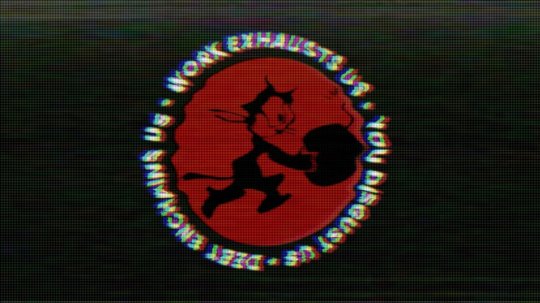
7 notes
·
View notes
Text
What’s So Wrong With Having Heroes?
When I was a little kid, I wanted to be a doctor or a veterinarian. I wanted to help heal. And even as a small child, it felt like my calling.
Most kids dream of becoming a hero. The firefighters, the builders, the astronauts. The one’s who get medals and standing ovations. There’s many very monetarily successful movies and comics about all the superheroes we dream of. The people we want to save us. At one point, I thought I could be a hero. I wanted to be.
Being a hero wasn’t an issue for me though. People started to notice acts of kindness in me, and when they held that in high regard, I did too. I did everything I could to help others. It came naturally.
I bandaged my siblings and pets and strangers up. I gave advice like a wise old man, my aunt thanked me for helping her to leave her abusive husband when I was 8. I saved two people from drowning when I was 10. I talked friends out of suicide a dozen times. I became a street medic. I have saved dozens of lives, often under extraordinary circumstances. By definition, I fit the one for ‘hero’.
And I have so many issues with it. This isn’t a humble brag.
I genuinely think that we, as a society, put certain people on pedestals that shouldn’t be. I don’t think anyone should be. The hierarchy of heroes is inequitable and unrealistic. I think we should do the right thing because it’s the right thing, not to win an award or a badge of honor.
I see headlines all the time that are just ‘hero firefighter does their job!’. They’re paid to do this, of course they’re going to do it. As an abolitionist, I see cops hailed as heroes, usually for doing the objectively right thing, and it seems to magically erase the realities of what they do, the systemic harm they perpetuate. It’s the entirety of the ‘there’s some good cops’ narrative. And it causes great detriment to our communities because it makes it seem like the police do more good than bad.
Society particularly loves to paint white, cishet, abled, rich, educated, affluent men as heroes. The ones who can save us. Our hero.
And yet we ignore the people who are saving lives left and right, like people who use drugs who Narcan their friends. Or trans youth who stay up all night with their suicidal friends. Or the street medics who set up civilian ambulances for their under-served and neglected communities.
No one’s giving them medals.
Beyond that, people aren’t checking in on heroes. I’ve heard “you’re incredible!” and “thank you” a million times, but rarely do people genuinely check in on me after I’ve rescued someone.
And I usually need it. I’m at my worst mentally and usually physically after a rescue. It often takes months or years to process those events— they are traumatic for the rescuer too. Especially those of us without formal training or those of us who have attempted to rescue someone and lost them. We’re left to drift among all of these confusing and conflicting emotions, sometimes never understanding why.
The worst thing I hear: “I could NEVER do what you did”. It breaks me apart every time.
I don’t want to be doing this alone. I don’t want to have to save people over and over. I can’t save everyone.
I have to repeat that last one like a mantra sometimes.
I can’t save everyone. And so often, I still try to. I jump in without thinking. I throw myself into danger and worry about myself last, or, never. And it usually ends with me being seriously injured.
When I’d bandage up my siblings and pets it was after our parents hit us. I stepped in front of them as often as I could. I swallowed so much water while trying to save someone from drowning because they kept pulling me under that I puked. My 20-something-year-old boyfriend I dated when I was 16 stabbed me with the knife I had just talked him out of cutting himself with. He went on to keep caving my face in and choking me until I was blue. And of course, I’ve been seriously injured dozens of times during rescues. My body physically hurts so much afterwards, let alone the emotional toll.
I have to wonder: What would happen if I didn’t step in? Would it be so bad?
But of course, my brain always answers with a thousand of the worst case scenarios— or, just with what happened anyways. Sometimes people die no matter how much you try to fight to save them. And that has to just be what it is.
I think sometimes people live, and that just has to be what it is too.
But when we ascribe people as heroes, the message we send is that some people are heroes, some people aren’t. And I feel so strongly that this isn’t true. I believe that everyone has the capacity to help others, and so often, they do so in seemingly insignificant ways, and their deeds are not recognized.
Small acts of kindness are never small.
Life saving happens in everyday, ordinary ways. Sometimes what has saved my life has been something the other person will never remember or know. The Christmas cards from the elementary schoolers sent to the homeless shelter I lived at. The partners and friends who sat with me until I was safe on my own. My friends who held my hand as my heart beat dangerously fast, their presence being all I could feel, replacing the tightness in my chest. My cat cuddling me, purring until she snores. Strangers holding doors, strangers carrying my groceries, strangers checking on me. The dozens of items from my Amazon wishlists that have kept me alive.
I wish I could say how thankful I am to the community that’s kept me alive. How every time they’ve called me a hero, it’s because they made me possible. That they’re a hero just as much as I am.
I read ‘Mutual Aid: Building Solidarity During This Crisis (And The Next)’ by Dean Spade recently. In it, Dean describes “leader-less and leader-full” movements. It’s exactly what we need in the world. Hero-less and hero-full communities. We don’t need a select few— we need communities and societies structured around giving care. We need it to be standard, not extraordinary.
Personal responsibility can lead to community responsibility. We could have thriving, beautiful communities where we all care for each other so fully that no one single person is a savior, because we are all uplifted equitably.
I urge everyone I know to be more like the heroes they uplift. To think about what values they hold in high regard in others and to apply them to their own actions. To be what they already are, and acknowledge it.
You’re included.
#heroes#chronically couchbound#tw#hero#abolitionist#savior complex#white savior#white saviour complex#personal essay#leftist#anarchist theory#leftist theory#mutual aid#mutual aid networks#community care#feminist theory#inspiration#inspirational#inspiring heroes#everyday heroes#liberationist#equity
39 notes
·
View notes
Text
youtube
16 notes
·
View notes